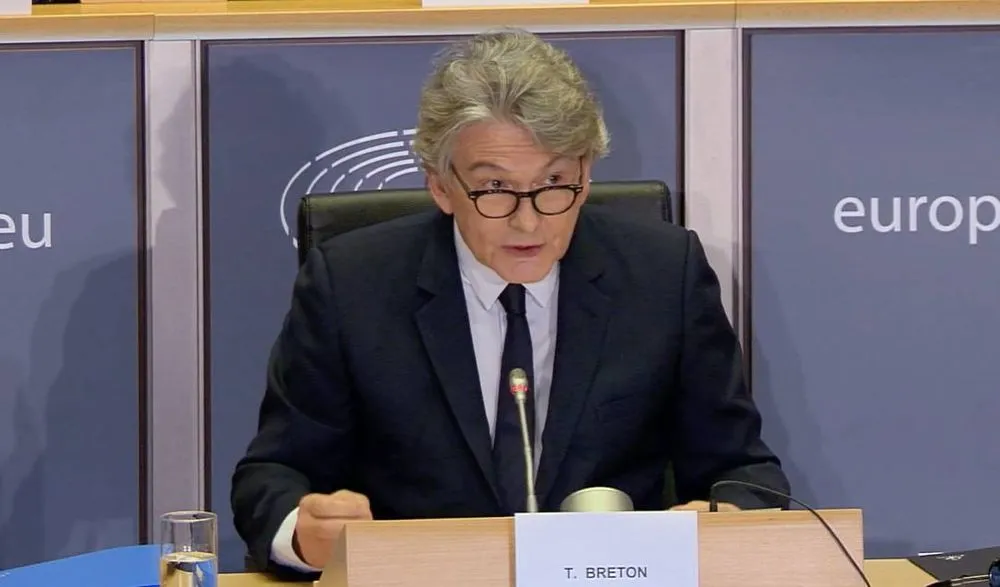European Commission misfires in initial DSA enforcement, experts say
The European Union’s recent warnings to social media platforms asserting that they are in violation of the newly-enacted law meant to rein in disinformation and other online abuses are poorly executed and come before the commission is prepared to enforce them, experts and advocates say.
The landmark Digital Services Act is seen as a once-in-a-generation attempt to restructure the internet. As the Israel and Hamas conflict has unfolded with an unprecedented volume of disinformation swirling around it, European Commissioner for Internal Market Thierry Breton has jumped at the opportunity to flex his new powers, according to a new report from the Atlantic Council’s Digital Forensic Research Lab (DFRLab).
On October 10 and 13 Breton sent letters to X (formerly Twitter), Meta, TikTok, and YouTube, focusing on how disinformation and illegal content about the Israel-Gaza conflict as well as upcoming elections in European countries were in violation of the DSA, which applies a special set of rules to what it calls “very large online platforms.”
Breton’s actions may have been well-meaning, but he drastically overreached given the nascent DSA’s lack of structure, according to Rose Jackson, a disinformation scholar and co-author of DFRLab’s report analyzing the matter.
The DSA won’t fully take effect until February 2024, but the implementation process has begun.
The conflict between Israel and Hamas is forcing “the European Union to try to figure out how to have a test run of the DSA before they're really ready,” Jackson said in an interview.
Jackson said that while there is a lot that Europe can learn from this conflict and how to succeed at rewriting the rules of the internet, it needs to be “really careful about not allowing whatever happens in this kind of crisis moment to become the default law.”
The Breton letters referenced DSA procedures, but “did not seem to have a basis in DSA processes,” Jackson’s report said.
In a blistering letter sent to Breton last week, the digital rights advocacy group Access Now said it was concerned about how the letters interpreted the DSA, saying they established a “false equivalence” between the DSA’s treatment of illegal content versus disinformation.
The DSA lacks provisions for implementing deadlines for content removals under which platforms need to reply to notifications of illegal content, however, the Breton letters imposed tight timelines, the Access Now letter said. In some cases, Breton demanded platforms revert with answers within 24 hours.
Breton posted the letters on X and other social media platforms, a move the advocates called problematic.
#TikTok has a particular obligation to protect children & teenagers from violent content & terrorist propaganda —as well as death challenges & potentially life-threatening content.#DSA sets out very clear obligations TikTok must comply with.
— Thierry Breton (@ThierryBreton) October 12, 2023
Letter to TikTok CEO Shou Zi Chew⤵️ pic.twitter.com/J1tpVzXaYR
“By issuing such public letters in the name of DSA enforcement, you risk undermining the authority and independence,” of the DSA’s enforcement team, according to the Access Now letter.
Breton’s letters also demand Meta and X engage with law enforcement authorities and EUROPOL, the Access Now letter asserts, saying they do so “without specifying serious crimes occurring in the EU that would provide sufficient legal and procedural ground for such a request.”
The actions of the last few weeks “risks derailing sensitive and complex conversations about what information is most useful and in what form; who should have access to that information and how; what it means to have meaningful algorithmic transparency; and how the European Commission will approach its new powers,” Jackson wrote.
She points out that social media platforms’ active participation will be needed to realize the full vision of the DSA.
“How the EC approaches them in this crisis moment will undoubtedly have an impact on the direction of these bigger conversations,” Jackson’s report said. “There is risk that this confusing first move could undermine the credibility of the endeavor at its most critical moment.”
Suzanne Smalley
is a reporter covering digital privacy, surveillance technologies and cybersecurity policy for The Record. She was previously a cybersecurity reporter at CyberScoop. Earlier in her career Suzanne covered the Boston Police Department for the Boston Globe and two presidential campaign cycles for Newsweek. She lives in Washington with her husband and three children.



